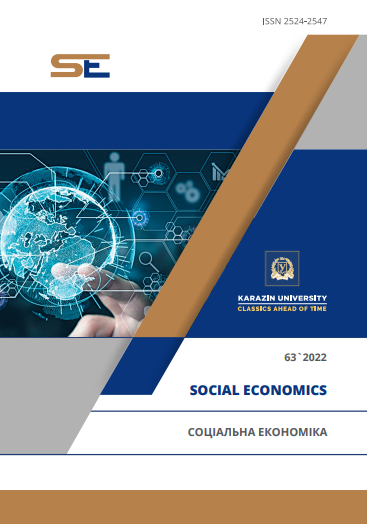INTELLECTUAL POTENTIAL STRUCTURE IN THE MODERN PARADIGM OF ENTERPRISE MANAGEMENT
Abstract
Abstract. The article is devoted to the research of the industrial enterprises management conceptual approach, which is based on the managerial innovations introduction in the context of the intellectual potential use and development. It is accented that traditional concepts do not fully reflect the modern imperatives of the general management paradigm in the intellectual production system. Modern practice of enterprises intellectual and innovative activities organizing shows, that the effective use of intellectual potential is one of their successful functioning and development determining factors. It is proved that the study of intellectual potential should be approached from two sides: on the one hand – as a set of people – owners of knowledge focused on cognitive and transformational activities, and on the other – as a set of scientific, technical, social, cultural knowledge represented by material and technical forms. Theoretical approaches to the description of elements and architectonics of the enterprise intellectual potential structure are analyzed and a number of differences are identified, which complicate the development of practical recommendations in the context of Ukrainian economy real sector competitiveness increasing. The main factors influencing the formation of the enterprise intellectual potential structural components are specified. The intellectual potential structure in relation to the realities of modern enterprises innovative activity is substantiated. The author's definition of the categories essence "creative potential", "professional qualification potential", "hidden potential of innovations" is given. It is proved that each intellectual potential element is a kind of set of possibilities, owing to the interaction of which a synergetic effect is achieved and the production system acquires new properties that are not inherent in each individual component. The importance of harmonious development of the enterprise intellectual potential elements in order to maintain the stability of its activities and increase competitiveness in the market is emphasized.
Downloads
References
Guzenko, G. M, & Gaiduchenko, Y. O. (2013). Intellectual potential as a basis for the knowledge economy formation. Bulletin of the National University "Yaroslav the Wise Law Academy of Ukraine", 13, 84-97. (іn Ukrainian)
Semykina, M. (2012). Intellectual potential: social dimensions of use and development. Cherkasy: LLC "MACLAUT". (іn Ukrainian)
Revak, I. O. (2014). Structural components of the intellectual potential of the state. Bulletin of Chernihiv State Technological University, 3 (75), 52-62. (іn Ukrainian)
Butnik-Siversky, O. (2017). Formation of neo-economics in the sphere of intellectual property from the position of intensification processes. Theory and practice of intellectual property, 3, 57-67. (іn Ukrainian)
Kozmenko, S. (Ed.). (2005). Potential of innovative development of the enterprise. Sumy: Business prospects. (in Russian)
Moiseenko, I. P. (2010). Management of economic entities intellectual potential in the national economy. (Doctoral dissertation). Lviv. (in Ukrainian)
Tymoshenko, N. Yu. (2010). Aspects of management of intellectual potential of industrial enterprises. Economic Bulletin of NTUU "KPI", 7, 133-136. Retrieved from http://economy.kpi.ua/files/files/26_kpi_2010_7.pdf. (іn Ukrainian)
Rud, N. T, & Gavrilyuk, Yu. M. (2011). Intellectual potential: factors of formation and realization. Economic sciences, 8, 283-297. (іn Ukrainian)
Large explanatory dictionary of the modern Ukrainian language: 170,000 words and phrases. (2020). K.; Irpen: WTF "Perun". (іn Ukrainian)
Datsii, N. (2021), Intellectual potential management as a new paradigm of sustainable development of public administration, Investytsiyi: praktyka ta dosvid, 16, 64-69. doi: https://doi.org/10.32702/2306-6814.2021.16.64. (іn Ukrainian)
Zhovnovach, R., Malakhovskyi Y., & Bessonova S. (2020). Intellectualcentric paradigm of industrial enterprises management. Efficient economy. doi: https://doi.org/10.32702/2307-2105-2020.2.11. (іn Ukrainian)
Murashko, I. V. (2010). Disclosure of the concept of "personal potential" and its psychological structure. Current problems of psychology, 7, 196-205. (іn Ukrainian)
Molyako, V. O. (2008). Psychological study of the creative potential of the individual. Kyiv: Pedagogical Thought. (іn Ukrainian)
Runco, M. A. (2003). Education for Creative Potential. Scandinavian Journal Of Educational Research, 47, 3, 317-324.
Reid, R. (2017). 5 Essential Keys to Unlocking Personal/Professional Potential. Retrieved from https://www.linkedin.com/pulse/5-essential-keys-unlocking-personalprofessional-potential-bob-reid.
Milyaeva, V. R., Lebid, N. K, & Breus, Yu. V. (2013). Theoretical analysis of the concept of personality potential. Problems of modern psychology, 5, 405-415. (іn Ukrainian)
Biletska, K. V. (2014). Labor potential as a factor in activating innovation processes. Efficient economy, 4. Retrieved from http://www.economy.nayka.com.ua/?op=1&z=2932. (іn Ukrainian)
Orban-Lembryk, L. E. (2010). Social psychology. Chernivtsi. Books – XXI. (іn Ukrainian)
Chamorro-Premuzic, T. (2016). What Science Tells Us About Leadership Potential. Harvard Business Review. Retrieved from https://hbr.org/2016/09/what-science-tells-us-aboutleadership-potential.
Saddington, J. (n.d.). Management Potential. Retrieved from https://john.do/management-potential/.
Vassiliadou, M. (2008). Axiological Anthropology and the Promotion of Mental Health. London.
Schmitt, D. P., & Pilcher, J. J. (2004). Evaluating Evidence of Psychological Adaptation How Do We Know One When We See One? Psychological Science, 15, 643-649.
Assessment of professional potential. Indiana University East. (n.d.). Retrieved from http://www.iue.edu/education/documents/APP%20form.pdf.
Martin, B., & Moraitis, D. (2016). The Inner Aura and Your Spiritual Potential. Spiritual Arts Institute. Retrieved from https://spiritualarts.org/blog/change-your-aura/the-inner-aura-and-your-spiritualpotential.
Ostrovska, H. Y., Maliuta, L. Ya., Sherstiuk, R. Р., Lutsykiv, I. V., & Yasinetska, I. А. (2020). Development of intellectual potential at systematic paradigm of knowledge management. Naukovyi Visnyk Natsionalnoho Hirnychoho Universytetu, 4, 171-178. doi: https://doi.org/10.33271/nvngu/2020-4/171.
Ostrovska, H., Tsikh, H., Strutynska, I., Kinash, I., Pietukhova, O., Golovnya, О., & Shehynska, N. (2021). Building an effective model of intelligent entrepreneurship development in digital economy. Eastern-European Journal of Enterprise Technologies, 6, (13(114), 49-59. doi: https://doi.org/10.15587/1729-4061.2021.244916.
Kraaijenbrink, J., Spender, J. C., & Groen A. J. (2010). The Resource-Based View: A Review and Assessment of its Critiques. Journal of Management, 36, 1, 349-372.
Teece, D. J. (2014). A Dynamic Capabilities-Based Entrepreneurial Theory of the Multinational Enterprise. Journal of International Business Studies, 45(1), 8-37.
Ostrovska, H. (2021). Industrial enterprises potential management by the dynamic capabilities criterion. Bulletin of V. N. Karazin Kharkiv National University Economic Series, 100, 78-87. doi: https://doi.org/10.26565/2311-2379-2021-100-08. (іn Ukrainian)
El Sawy, O. A, & Pavlou, P. A. (2008). IT-enabled business capabilities for turbulent environments. MISQ Executive, 7(3), 57-68.




